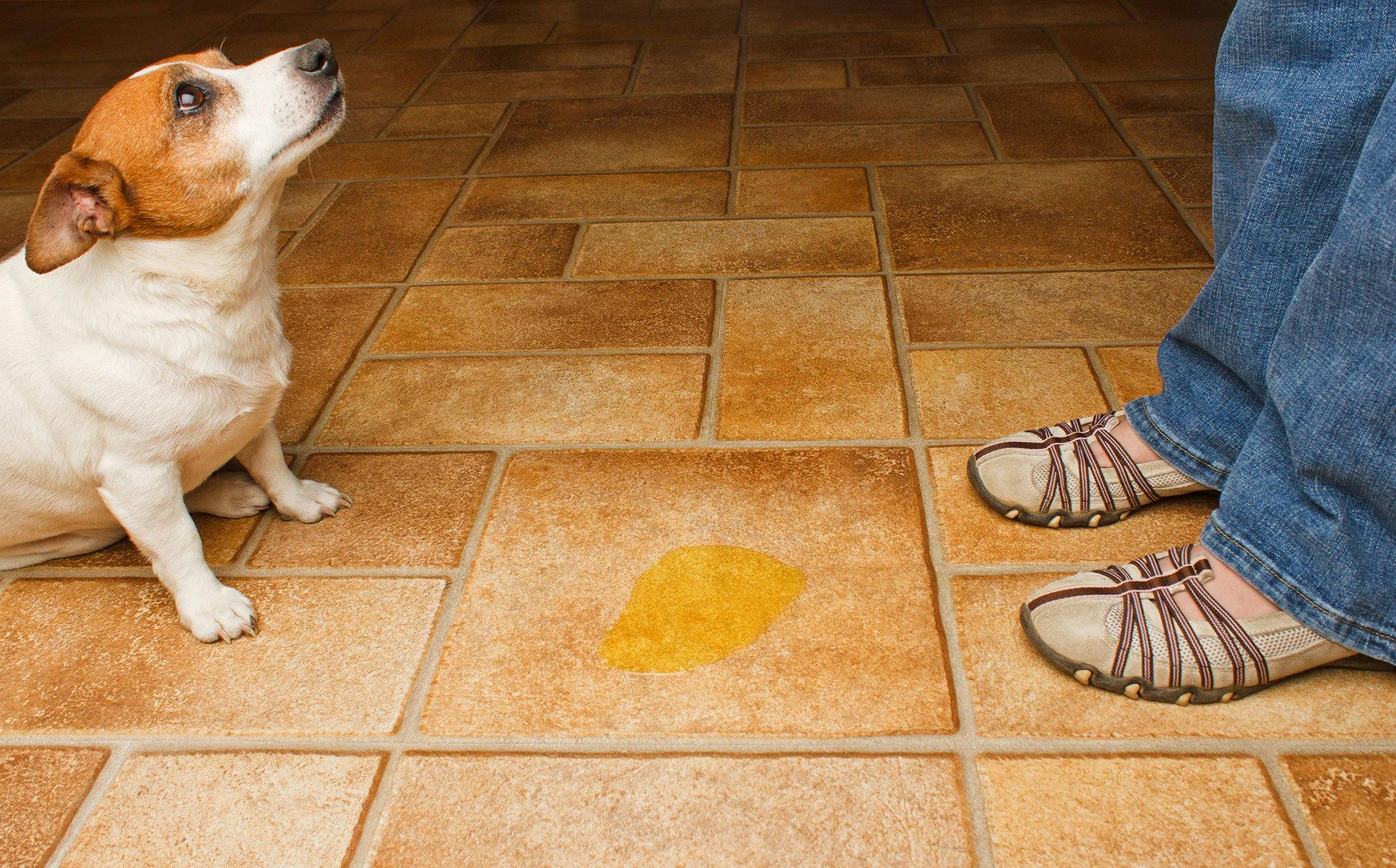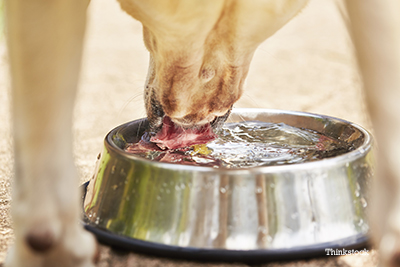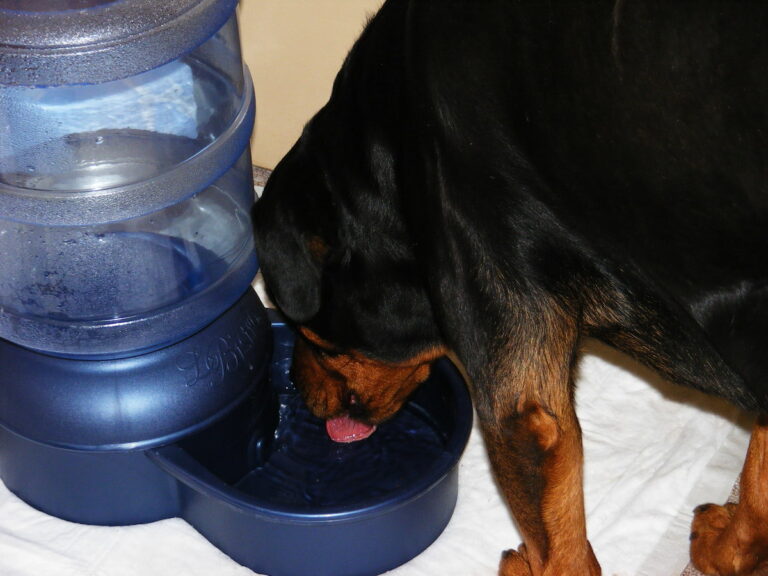If your dog is drinking a lot of water and peeing a lot, it could be a sign of kidney damage, infection, toxins, or cancer. This can result in excessive urine production and increased thirst.
Other factors, such as boredom, heat, salty foods, dehydration, medication side effects, or illnesses, may also contribute to your dog’s increased water intake. It is important to monitor your dog’s drinking and urination habits, and consult with a veterinarian if you are concerned about your dog’s excessive water consumption or frequent urination.
Changes in these habits can be indicative of underlying health issues that require medical attention.

Credit: wagwalking.com
Causes Of Excessive Drinking And Peeing In Dogs
Dogs can experience excessive drinking and peeing for various reasons. It’s important to understand the potential causes to ensure your furry friend’s health and well-being. The following are three common causes of excessive drinking and peeing in dogs:
Chronic Disease
Chronic diseases can lead to an increase in water intake and urine production in dogs. Diseases such as diabetes mellitus, liver disease, kidney disease, and bladder infections can result in damage to the kidneys, preventing them from properly regulating water and waste in the body. This can lead to excessive thirst and frequent urination.
Infection
Infections, particularly bladder infections and pyometra (a uterine infection in female dogs), can cause excessive drinking and urination in dogs. These infections can irritate the bladder, resulting in increased urine production and more frequent trips to the bathroom.
Toxins Or Cancer
Toxins or cancerous growths can also disrupt the normal functioning of a dog’s kidneys, causing them to produce more urine. Certain medications or exposure to harmful substances can lead to excessive thirst and more frequent urination. Additionally, cancerous tumors can affect the kidneys or bladder, contributing to the increased water intake and peeing.
It’s crucial to monitor your dog’s behavior and habits. If you notice any significant changes in their drinking or peeing patterns, it’s essential to consult with a veterinarian. They can assess your dog’s symptoms and perform necessary tests to diagnose the underlying cause and provide appropriate treatment.

Credit: www.pethealthnetwork.com
Other Factors Contributing To Excessive Drinking In Dogs
Excessive drinking in dogs can be caused by factors such as bladder infection, pyometra, diabetes mellitus, liver disease, kidney disease, dehydration, cancer, electrolyte imbalances, and certain medications. Dogs may also drink more water and pee frequently due to boredom, heat, dehydration, medication side-effects, or underlying illnesses.
If your dog is exhibiting excessive drinking and urination, it’s important to consult a veterinarian for proper diagnosis and treatment.
Boredom Or Heat
Excessive drinking in dogs can be caused by factors such as boredom or overheating. When dogs are bored or experiencing extreme heat, they may drink more water to cool themselves down or relieve their boredom. It is important to provide plenty of mental and physical stimulation, as well as a cool and comfortable environment, to prevent excessive drinking due to these factors.Medication Side Effects
Some medications can cause dogs to drink more water than usual and subsequently urinate more frequently. For example, certain medications used to treat conditions like diabetes or kidney disease can have this side effect. If your dog is on medication and experiencing excessive drinking and urination, it is important to consult your veterinarian to determine if the medication could be the cause. They may be able to adjust the dosage or switch to a different medication to alleviate this issue.Possible Illnesses
Excessive drinking can also be a symptom of underlying illnesses in dogs. Conditions such as diabetes mellitus, kidney disease, bladder infection, or liver disease can cause increased thirst and urination. It is important to monitor your dog’s drinking and urination habits and consult your veterinarian if you notice any significant changes. They can perform a thorough examination and run tests to identify any possible illnesses that may be contributing to the excessive drinking. Early detection and treatment of these conditions can greatly improve your dog’s health and well-being.When To Be Concerned And Seek Veterinary Care
If your dog is drinking a lot of water and peeing excessively, it could be a sign of underlying health issues such as bladder infection, diabetes, kidney disease, or dehydration. It’s important to seek veterinary care to determine the cause and provide appropriate treatment for your furry friend.
If you notice that your dog is drinking a lot of water and peeing excessively, it can be a cause for concern. While it is normal for dogs to drink and urinate throughout the day, excessive thirst and urination can be signs of an underlying health issue. Monitoring your dog’s drinking and urination habits is crucial in maintaining their overall well-being. In this section, we will discuss the signs of serious diseases, polyuria and polydipsia, as well as testing for increased thirst and urination.Signs Of Serious Disease
Excessive thirst and frequent urination in dogs can be indicative of serious underlying diseases. It is important to look out for other symptoms that may accompany these signs, such as weight loss, decreased appetite, lethargy, or changes in behavior. These symptoms may suggest conditions like diabetes mellitus, liver disease, kidney disease, cancer, or electrolyte imbalances. If you observe any of these signs in your dog, it is crucial to seek veterinary care promptly to identify and address the underlying cause.Polyuria And Polydipsia
Polyuria refers to excessive urination, while polydipsia refers to excessive thirst. If your dog is experiencing polyuria and polydipsia, it could be an indication of an underlying health problem. While there can be various reasons behind these symptoms, it is essential to consult with a veterinarian to determine the underlying cause and provide appropriate treatment. Some potential causes of polyuria and polydipsia include bladder infection, pyometra, diabetes mellitus, or dehydration.Testing For Increased Thirst And Urination
To diagnose the cause of your dog’s increased thirst and urination, your veterinarian may perform a series of tests. These tests may include blood work, urinalysis, and imaging scans such as X-rays or ultrasounds. These diagnostic procedures help identify any underlying health conditions that may be contributing to your dog’s symptoms. Based on the test results, your veterinarian will develop an appropriate treatment plan to address the specific issue and help your dog return to optimal health.In Conclusion
If you notice that your dog is drinking a lot of water and peeing excessively, it is important to be aware of the signs of serious diseases and seek veterinary care promptly. Conditions such as diabetes mellitus, kidney disease, or bladder infections can cause these symptoms. Monitoring your dog’s drinking and urination habits, along with observing any accompanying symptoms, can provide valuable information for your veterinarian to make an accurate diagnosis and develop a tailored treatment plan. Remember, early intervention is key in maintaining your dog’s health and well-being.
Credit: www.everydayhealth.com
Frequently Asked Questions Of Dog Drinking A Lot Of Water And Peeing A Lot
Why Does My Dog Drink So Much Water And Pee So Much?
Excessive drinking and urination in dogs can be caused by various factors such as kidney damage, infection, toxins, or cancer. When the kidneys are damaged, they cannot function properly and produce excessive urine, leading to increased thirst. Watch for other symptoms and consult a veterinarian if concerned.
When Should I Be Concerned About My Dog Drinking Too Much Water?
If your dog is drinking too much water, it can be a cause for concern. Excessive water intake can be a sign of various issues such as bladder infection, diabetes mellitus, kidney disease, or dehydration. It’s important to monitor your dog’s water intake and consult a veterinarian if you notice any abnormal behavior.
Why Does My Dog Suddenly Want To Drink A Lot Of Water?
When a dog suddenly wants to drink a lot of water, it could be due to various reasons such as bladder infection, diabetes, liver disease, kidney disease, dehydration, cancer, electrolyte imbalances, or medications. Excessive drinking may indicate an underlying health issue that requires veterinary attention.
Should I Be Worried If My Dog Is Peeing A Lot?
If your dog is peeing a lot, it could be a sign of underlying health issues such as bladder infection, diabetes, or kidney disease. It’s important to monitor your dog’s drinking and urination habits and consult a veterinarian if you’re concerned.
Conclusion
If your dog is drinking a lot of water and peeing excessively, it is important to understand that there could be underlying health issues causing these symptoms. Conditions such as bladder infection, diabetes mellitus, kidney disease, or dehydration may be the culprits.
It is crucial to monitor your dog’s behavior and consult with a veterinarian if you are concerned about their water intake and urination. Remember, early detection and proper diagnosis are key to ensuring your furry friend’s well-being.



